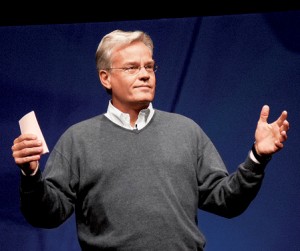50 leaders of the evangelical generation: #19 Bill Hybels. Church changer
[I am working on a project that may become a book on the most influential evangelicals leaders of our generation, since 1976, and the impact they’ve had on the church and their times. I will introduce them briefly on this blog from time to time. Who should be on this list?]
#19 Bill Hybels. Church changer b.1951
Walk into most evangelicals churches in America today, large and small, and you are likely to see the influences in worship style and service components of Bill Hybels and the Willow Creek church and association. It is particularly true in the megachurches, regardless of their evangelical flavor–from reformed to Wesleyan, charismatic or Baptist. Early, he was criticized for using marketing language to sell church and accused of smoothing the sharp corners off the Gospel to make it more “seeker-sensitive.” In recent years the Willowcreek team has been its own strongest critic, faulting its failure to adequately develop spiritual maturity while creating an enormous, active congregation.
Hybels’ South Barrington, Illinois, church is the third most attended in the country, with an average weekly attendance exceeding 23,000, and the nation’s most influential church for the last several years in a national poll of pastors. He is also the founder of the Willow Creek Association and creator of the Global Leadership Summit.
In 1971, as youth pastor at Park Ridge’s South Park Church, Hybels started a youth group with friend Dave Holmbo. With modern music, dramatic skits and multimedia combined with Bible studies in relevant language, the group grow from 25 to 1,200 in just three years.
After 300 youth waited in line to be led to Christ in a service in May 1974, Hybels and other leaders began dreaming of forming a new church. They surveyed the community to find out why people weren’t coming to church. Common answers included: “church is boring”, “they’re always asking for money”, or “I don’t like being preached down to.” These answers shaped the group’s approach to creating a new church, Willow Creek.
In October 1975 the group held their first service at Palatine’s Willow Creek Theater. 125 people attended the service. The rent and other costs were paid for with 1,200 baskets of tomatoes, sold door-to-door by 100 teenagers. Within two years the church had grown to 2,000 and in 1981 it moved to its current suburban location.
Willow Creek is the prototypical megachurch, with modern worship, drama and messages focused on the unchurched. Through its association, Willow has promoted a vision of church that is big, programmatic, and comprehensive.
Not long ago Willow released its findings from a multiple year qualitative study of its ministry. Willow Creek leadership wanted to know what programs and activities of the church were actually helping people mature spiritually and which were not.
The research revealed that “increasing levels of participation in these sets of activities does not predict whether someone’s becoming more of a disciple of Christ. It does not predict whether they love God more or they love people more.”
Speaking at his Leadership Summit, Hybels summarized the findings:
“Some of the stuff that we have put millions of dollars into thinking it would really help our people grow and develop spiritually, when the data actually came back, it wasn’t helping people that much. Other things that we didn’t put that much money into and didn’t put much staff against is stuff our people are crying out for.
We made a mistake. What we should have done when people crossed the line of faith and become Christians, we should have started telling people and teaching people that they have to take responsibility to become ‘self feeders.’ We should have gotten people, taught people, how to read their Bible between services, how to do the spiritual practices much more aggressively on their own.
Now, our dream is to fundamentally change the way we do church. That we take out a clean sheet of paper and we rethink all of our old assumptions. Replace it with new insights that are informed by research and rooted in Scripture. Our dream is really to discover what God is doing and how he’s asking us to transform this planet.”.
More than any other person of his generation, Bill Hybels developed a church ministry plan, found the blend of stability and innovation, and built a team that figured out how to involve modern, message-saturated Americans in church programs and services—in very large numbers for many years. But perhaps even more important, Hybels found an effective way to share that information with other church leaders, and then after painstaking measurement publicly admit mistakes—not in church building or evangelism, but in not more successfully leading believers to deeper levels of Christian maturity—and commit to correcting them.
Filed under: Christianity • Jim
Like this post? Subscribe to my RSS feed and get loads more!

